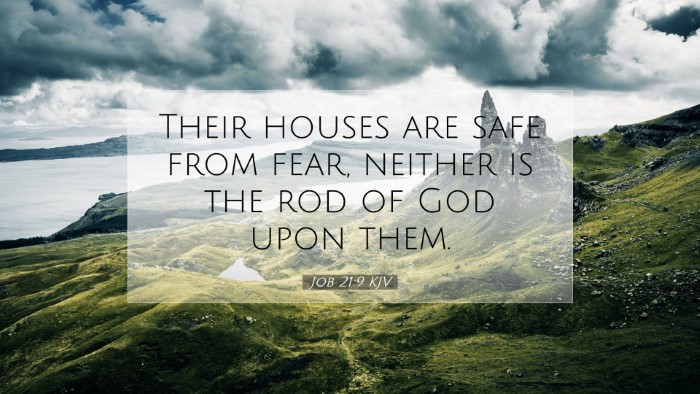Commentary on Job 21:9
Verse: Job 21:9 – “Their houses are safe from fear, and the rod of God is not upon them.”
Introduction
The verse under consideration, Job 21:9, encapsulates a profound interrogation of the justice of God as perceived in the contemporary understanding of suffering and prosperity. Job’s statement serves to highlight a significant aspect of the Age-old question of why the wicked prosper while the righteous suffer. Commentaries from public domain sources such as those by Matthew Henry, Albert Barnes, and Adam Clarke provide a rich tapestry of insights that may inform our understanding of this text.
Contextual Analysis
This verse is found in the response of Job to the assertions made by his friends who maintain that suffering is an indicator of divine punishment for sin. Job counters this notion by observing the seemingly unaffected lives of the wicked, who appear to enjoy peace and security. This sets the stage for a dialogue on the nature of divine justice, human suffering, and the apparent contradictions found within life itself.
The Prosperity of the Wicked
-
Matthew Henry: Henry elucidates that Job's assertion points out the worldly prosperity of the wicked, which serves as a challenge to the simplistic belief that good always follows good and evil always leads to evil. He states, “The rod of God, by which He corrects the children of men, is far from them; they live in ease and plenty.”
-
Albert Barnes: Barnes affirms this sentiment, emphasizing that the apparent security and peace experienced by the ungodly challenge the notion of immediate retribution. He posits that this observation, made by Job, showcases the confounding reality that can lead to misinterpretations about God’s justice.
-
Adam Clarke: Clarke adds depth to the theological implications of this verse by suggesting that the prosperity of the wicked may lead believers to struggle with doubt concerning their faith. He points to the moral dilemmas and complex nature of divine governance that can result in existential crises among the pious.
God’s Justice and Human Perception
The core of Job's argument lies in the observation that human perception often falters when confronted with the realities of life. The claim that “the rod of God is not upon them” highlights the tension between perceived justice and actual experience. This thought prompts further reflections on the nature of suffering and the purposes it may serve.
-
Matthew Henry: He views this as a call for humility in understanding God’s purposes. Human beings often see only a small part of the divine plan, leading to misconceptions about prosperity and suffering.
-
Albert Barnes: He argues that the observation of the wicked being prosperous serves to emphasize the mystery of providence, where God’s ways are higher than human ways. It elicits questions about divine justice that require faith to navigate.
-
Adam Clarke: Clarke notes that Job’s statement reflects a challenge to traditional thought. The frequent appearances of evil persons thriving can lead to despair in the righteous; hence, Clarke highlights the need for patience and a long-term vision of divine justice.
Theological Implications
Both the certainty of eternal judgment and the elusive nature of temporal justice are substantiated by examining Job’s reflections. The theological implications are vast, extending beyond mere observation into the realms of eschatology and divine providence.
-
Matthew Henry: He introduces the concept of a greater judgment that awaits the ungodly, echoing the belief in eternal retribution. Even though they escape temporal troubles, moral accountability still looms large in the eschatological future.
-
Albert Barnes: Barnes highlights that the apparent success of the wicked should steer believers towards a deeper trust in God’s ultimate justice. He argues for the assurance that righteousness will be rewarded, albeit in God's timing.
-
Adam Clarke: Clarke concludes this line of thought by suggesting that Job’s contemplation encourages believers not to lose heart but to remain steadfast, assuring them of God’s greater plan in their trials.
Concluding Thoughts
Job 21:9 stands as a significant point of reflection for theologians and scholars alike, challenging simplistic understandings of divine justice. The insights gleaned from notable commentaries illustrate a multi-faceted understanding of suffering, prosperity, and God's governance. For pastors and students alike, recognizing the depth of Job's words can foster a more profound compassion for those who suffer, coupled with a renewed sense of hope in the ultimate righteousness that God will administer.
As we ponder this verse, it becomes evident that faith is often tested in the crucible of apparent injustice. Job’s fearless inquiry invites believers to embrace their questions, understanding that seeking wisdom requires grappling with the profound mysteries of life under God’s sovereign hand.


